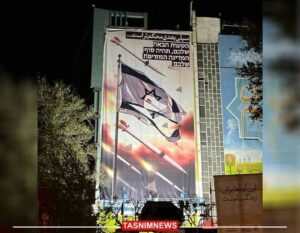[vc_row][vc_column][vc_column_text]Originally posted on the Jerusalem Post
During the past 11 years, Hezbollah has significantly improved its military capabilities in UNIFIL’s area of operation.
Less than a month ago, the United Nations Security Council decided to extend UNIFIL’s mandate in Lebanon (UNSCR 2373, August 30) for a year, with some new demands. Hezbollah men harassed a senior Malayan UNIFIL convoy that included the Malayan Deputy of Defense, UNIFIL’s commander of the western sector and the Malayan battalion commander. Hezbollah men blocked the road in the village of Safad al Batikh, inside UNIFIL’s area of operation, so that the convoy was unable to continue on its way back from an event hosted by the municipality. The blockade was a blatant violation of Article 10 in UNSCR 2373, passed in August, which “…urges all parties… to respect the safety of UNIFIL and to ensure that the freedom of movement of UNIFIL is fully respected and unimpeded….”
During the past 11 years, Hezbollah has significantly improved its military capabilities in UNIFIL’s area of operation. According to Israeli assessments, 40,000 to 50,000 rockets targeting Israel are hidden inside or under the Shi’ite villages in southern Lebanon by Hezbollah in violation of UNSCR 1701, a 2006 resolution that called for the establishment of an “area free of any armed personnel, assets, and weapons other than those of the Government of Lebanon and UNIFIL” between the “Blue Line” and the Litani River.
It should be stressed, that none of the above is new and both resolutions are very similar. UNSCR 2373 is merely an attempt to change the awkward reality of the past 11 years, in which UNIFIL has become a fig leaf for Hezbollah’s military deployment in southern Lebanon.
UNSCR 2373 is a compromise between the US new policy headed by Ambassador Nikki Haley on one hand and the Lebanese government on the other. Ambassador Haley wished to create a situation in which the UN forces are reinforced and their presence in the area is enhanced. UNIFIL will inform the UN Security Council in real time about any violation of Resolution 1701 or other disturbances by Hezbollah – as is mentioned in UNSCR 2373. The Lebanese government wished to emphasize that UNIFIL will work together with the Lebanese armed forces, to create the “new strategic environment in southern Lebanon” that Ambassador Haley actually wanted.
The decision to extend UNIFIL’s mandate was perceived by most of the Arab media as a step that will not lead to any change in the balance of power in southern Lebanon. They pointed to the unchanged UNIFIL activity or authority in the region. Lebanese Foreign Minister Jubran Basil said, “Israel tried to alter UNIFIL’s missions, but we succeeded in preventing that. Lebanon needs to stand on guard to prevent any new attempt regarding this issue.” The Lebanese newspaper Al-Akhbar reported passage of UNSCR 2373 with the headline “Washington failed in turning UNIFIL into a patronizing force!” Later, Lebanese President Michelle Aoun, interviewed by Almonitor, said that UNIFIL is not a military force and therefore Lebanon cannot authorize UNIFIL to search for weapons in Lebanese houses. He added that Hezbollah would not be asked to disarm itself as long as Israel threatens and attacks Lebanon.
In an interview with Le Figaro, Aoun commented: “Hezbollah uses its weapon to ensure our resistance against the Israeli entity, which still occupies a part of our land – about 30 kilometers of Sheba’a farms and refuses to implement and respect the international authority’s decisions. We cannot prevent Hezbollah from holding weapons as long as Israel does not respect the decisions of the international authority and the decisions of the UN.”
President Aoun referred to the village of Ghajar, through which runs the international border, and is divided between Israel and Lebanon, even though all its residents are Israeli citizens. Both UNSCR 1701 and 2373 called for the immediate withdrawal of the Israeli army from northern Ghajar without further delay – in coordination with UNIFIL.
As for the Shaba’a Farms, although the UN determined that Israel had retreated (from Southern Lebanon) to the international border in July 2000, Hezbollah and the Lebanese government have been arguing that Shaba’a Farms is Lebanese territory occupied by Israel – notwithstanding the historic fact that it was seized from Syria during the Six Day War in 1967 and not from Lebanon.
Returning to UNIFIL’s activity in southern Lebanon, the group has frequently been harassed by Hezbollah activists, who prevented them from finding any evidence of Hezbollah’s military operations in the villages. Yet, it seems that on this occasion – assuming the incident against the Malayan convoy was planned – Hezbollah crossed some red lines, testing whether there really is a “new-look” UNIFIL. This time, the UNIFIL force sharply condemned this event and declared, “It is not the first event that involves such a brutal attack against UNIFIL’s convoys and patrols.”
Would this condemnation suffice? Allegedly, it may seem that the Lebanese army is heading in the right direction. Just last week, the Lebanese military published, for the third time this year, a statement reminding all citizens of the “obligation to avoid hunting and moving around armed with any weapon, especially in the area between the south of the Litani River and the international border.
Criminals will be arrested and judged.” However, the army is unwilling to confront the source of the problem – Hezbollah.
Moreover, Hezbollah is a member of the Lebanese government and is emerging as a prominent factor on the strategic level – taking into consideration its victories against the rebels in Syria and against ISIS on the Lebanese- Syrian border. In this confronting this reality, Ambassador Haley and the US administration would have to find more creative ways to challenge Hezbollah’s military posturing against Israel on its northern border.
Sarit Zehavi is a lieutenant colonel in the IDF reserves, served for 15 years in the military specializing in intelligence and holds an MA in Middle East Studies from Ben-Gurion University. She is the founder and CEO of ALMA, an organization specializing in research and analysis of Israel’s security challenges on the northern border.
Christina Hen is a researcher at ALMA. She holds an MA in political science and security studies from Tel Aviv University.
The original post on The Jerusalem Post[/vc_column_text][/vc_column][/vc_row]





